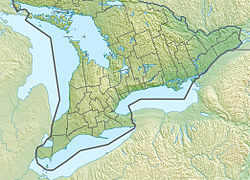Top Qs
Timeline
Chat
Perspective
Madawaska River (Ontario)
River in Ontario, Canada From Wikipedia, the free encyclopedia
Remove ads
The Madawaska River is a tributary of the Ottawa River in the St. Lawrence River drainage basin in Ontario, Canada.[1][2] The river is 230 km (143 mi) long and drains an area of 8,470 km2 (3,270 sq mi).[3] Its name comes from an Algonquian band of the region known as "Matouweskarini", meaning "people of the shallows".
Remove ads
Remove ads
Geography
The Madawaska River rises at Source Lake in geographic Canisbay Township in the Unorganized South Part of Nipissing District, in the highlands of southern Algonquin Park.[2] It flows east, dropping 380 m (1,247 ft) before emptying into the Ottawa River at Arnprior.
Tributaries
Lakes and reservoirs
The lower portion of the Madawaska River supports several large lakes, including:
- Centennial Lake
- Black Donald Lake
- Calabogie Lake
- Madawaska Reservoir (Arnprior Head Pond)
- Kamaniskeg Lake
Remove ads
History
In the late 19th century, the river was used to transport logs from the forested areas surrounding the river. Beginning in the 1960s, the river was used to generate hydroelectric power. Undammed sections of the river are also used for canoeing, kayaking and recreational fishing.

Around 1916, artist Tom Thomson followed the log drive down the river, painting the subject in The Drive (1916-17).[4]
Remove ads
Fauna
The most common species of game fish found in this river include walleye (yellow pickerel), northern pike, muskellunge, smallmouth bass, and largemouth bass.[5]
Hydroelectric Power
Ontario Power Generation (OPG) has 5 stations on the Madawaska.[6]
In June 2002 sluice gates at the Barrett Chute Generating Station were accidentally opened, killing two people, and injuring seven. OPG and two employees were charged with criminal negligence. Procedures at the plant were reviewed, and fencing added or repaired.[7]
The Calabogie station is being upgraded in 2022 to double capacity from 5 MW to 10 MW.[8] The original station was badly damaged by a tornado in September 2018. Clean up was completed in 2020. The project is expected to cost 100 million dollars. [9]
Remove ads
Provincial parks
Two sections of the river are designated and protected as provincial waterway parks:
- Upper Madawaska River Provincial Park, between Whitney and Madawaska; 10.85 km2 (4.19 sq mi).[10]
- Lower Madawaska River Provincial Park, between Latchford Bridge and Griffith; 12 km2 (5 sq mi).[11]
Both parks are administered by Ontario Parks but are non-operating, meaning there are no visitor facilities or services available. Both are ideal for whitewater canoeing.
Remove ads
See also
- Bonnechere River - nearby river with similar characteristics
- List of Ontario rivers
References
Sources
External links
Wikiwand - on
Seamless Wikipedia browsing. On steroids.
Remove ads


